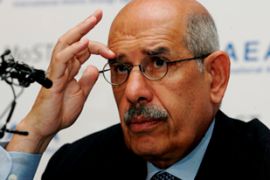Dismay at Iran nuclear response
Six world powers “disappointed” over Tehran’s response to proposed nuclear agreement.

Cooper said: “We urge Iran to reconsider the opportunity offered by this agreement … and to engage seriously with us in dialogue and negotiations.”
Sanctions discussed
Under the proposed deal, Iran was given the option of shipping about 75 per cent of its low-enriched uranium out of the country for it to be converted into fuel plates for a Tehran reactor that makes isotopes for cancer treatments.
Manouchehr Mottaki, Iran’s foreign minister, said on Wednesday that Tehran had misgivings about the deal and suggested that his country would instead agree to exchange its uranium for an equivalent amount of nuclear fuel, but only on its own territory.
Mottaki said Iran wanted to guarantee it would receive fuel it had contracted for.
Asked whether Iran’s stance would lead to new sanctions, a source familiar with the talks on Friday said there had been a general discussion on sanctions but no specifics were broached.
World powers want to reduce Iran’s low-enriched uranium stockpile below the amount needed, if refined to high purity, for a single atom bomb.
Iran has said that its nuclear programme is for peaceful purposes only.
‘Extreme distrust’
Earlier on Friday during a speech in Berlin, Mohamed ElBaradei, the head of the IAEA, pressed Iran to work with world powers over the issue.
“I would hate to see that we are moving back to sanctions,” ElBaradei said.
“Because sanctions, at the end of the day … really don’t resolve issues.”
He said the IAEA had not yet received a formal reply from Tehran to its proposals, although Iranian officials had told him they would not send uranium for reprocessing abroad unless they first received promised fuel rods.
ElBaradei described Iran’s stance as “an extreme case of distrust”.
“And what we are really trying to do is replace distrust by a degree of trust,” he said.
Mottaki played down the threat of sanctions on Thursday, saying embargoes had proved ineffective in the past and that he did not believe they would be tried again.